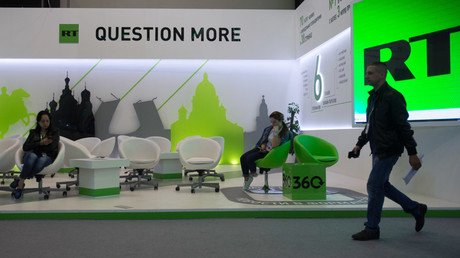The Washington Post serves up some Thanksgiving 'fake news' of its own

America's once venerable Washington Post has launched a Thanksgiving attack on the Russian media. Sadly for our friends on the Potomac, it turned out to be a bit of a turkey.
This month, the mainstream media’s primary narrative has shifted toward ‘fake news’ and its role in the US election. We’ve seen internet giants like Facebook pressured to get their act together on the issue and a series of investigations into the creators of misleading content.
Predictably, the “blame Russia for everything” constituency of the establishment press has tried to connect Moscow to this development.
Take the folks at the Washington Post, for instance, who have published a sensationalist and scaremongering piece about fake news stories that itself turned out to be, well, full of fakes. To be blunt, the Washington Post has lied about RT and presented zero proof to support its allegations. What’s more, it never even asked for a comment!
This means that its strangely crafted attempt to defend journalistic principles has effectively disobeyed the two most important rules of the business: namely “always double-check your sources” and “make sure to ask the subject of your story for a comment.”
Pundit problems
To start, WashPo references “researchers” to claim that some of the fake news and conspiracy theories plaguing the media coverage of the US election “originated with RT.” Mind you, not a single example is provided to support this lunacy – no link, no tweet, no article title.
Then the reporter, one Craig Timberg, quotes Michael McFaul – one of the ‘talking heads’ du jour for criticism of Russia – as saying RT expressed overt support for Donald Trump during the US election - which is pure fiction, apparent to anyone remotely familiar with RT’s actual programming. As regular readers know, RT has published many articles which indicated that Moscow had no clear preference in the contest, covered Trump scandals, and interviewed guests from all over the American political spectrum – Republican and Democrat, Libertarian and Green. We’ve invited Hillary Clinton too, and the invite still stands.
McFaul then concludes his contribution with the statement that RT used “the #CrookedHillary hashtag pushed by the candidate (Trump)” on its social media services. Like with the “origin story,” this claim is presented not as subjective opinion, but as unquestionable fact. In reality, this is another complete lie, one that WashPo would have had no trouble fact-checking with a simple search. Alas.
Thus, the Washington Post has hinged a piece about fake news on falsehoods. The irony is astounding.
‘#Fakenews’ & ‘post-truth’ politics? What about those Iraqi WMDs? (Op-Edge by @NeilClark66) https://t.co/Oy0ZtVwdK3pic.twitter.com/HHlz7pyVD2
— RT (@RT_com) November 21, 2016
Absence of proof
Timberg’s entire supposition is built around a collection of “suspicious episode” yarns, not facts or evidence. His argument revolves around tenuous social media interaction and unsubstantiated third-party claims. Outlets as diverse as “AntiWar,” “Counterpunch,” “Sputnik,” “Drudge Report,” “Off Guardian” and “Unz Review” are attacked alongside RT, not to mention internationally popular entities including “WikiLeaks,” “Zerohedge” and “Truthout.” Basically, anybody critical of US foreign policy is accused of “echoing Russia.”
Also telling is the two external “research” sources the article relies on: PropOrNot and FPRI. “PropOrNot” is described as “a nonpartisan collection of researchers with foreign policy, military and technology backgrounds.” In reality, this group’s modus operandi is to smear any news source outside of the mainstream as “reliably echo(ing) Russian propaganda.” Meanwhile, Foreign Policy Research Institute is a US think-tank with a very clear agenda of “advanc[ing] U.S. national interests,” funded by massive corporations, such as Boeing, who profit from east-west tension through increased military spending and still mired in the Cold War-era worldview.
With every day and every new wave of hysterical publications, it becomes difficult to deny that the real point of the current media campaign is to brand everything that runs counter to the establishment narrative as “fake news” and “Russian propaganda.”
Perhaps in the hope that once criticism and adversarial journalism is removed, the general public will no longer lash out at the tight little club that has ruled the roost for so long.
The statements, views and opinions expressed in this column are solely those of the author and do not necessarily represent those of RT.















